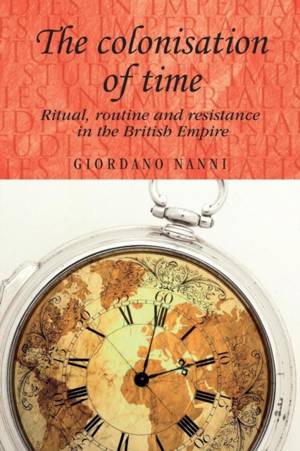
Je cadeautjes zeker op tijd in huis hebben voor de feestdagen? Kom langs in onze winkels en vind het perfecte geschenk!
- Afhalen na 1 uur in een winkel met voorraad
- Gratis thuislevering in België vanaf € 30
- Ruim aanbod met 7 miljoen producten
Je cadeautjes zeker op tijd in huis hebben voor de feestdagen? Kom langs in onze winkels en vind het perfecte geschenk!
- Afhalen na 1 uur in een winkel met voorraad
- Gratis thuislevering in België vanaf € 30
- Ruim aanbod met 7 miljoen producten
Zoeken
€ 48,45
+ 96 punten
Omschrijving
The colonisation of time is a highly original and long overdue examination of the ways that western-European and specifically British concepts and rituals of time were imposed on other cultures as a fundamental component of colonisation during the nineteenth century. Based on a wealth of primary sources, it explores the intimate relationship between the colonisation of time and space in two British settler-colonies (Victoria, Australia and the Cape Colony, South Africa) and its instrumental role in the exportation of Christianity, capitalism and modernity, thus adding new depth to our understanding of imperial power and of the ways in which it was exercised and limited. All those intrigued by the concept of time will find this book of interest, for it illustrates how western-European time's rise to a position of global dominance - from the clock to the seven-day week - is one of the most pervasive, enduring and taken-for-granted legacies of colonisation in today's world.
Specificaties
Betrokkenen
- Auteur(s):
- Uitgeverij:
Inhoud
- Aantal bladzijden:
- 304
- Taal:
- Engels
- Reeks:
- Reeksnummer:
- nr. 94
Eigenschappen
- Productcode (EAN):
- 9780719091292
- Verschijningsdatum:
- 30/11/2013
- Uitvoering:
- Paperback
- Formaat:
- Trade paperback (VS)
- Afmetingen:
- 156 mm x 234 mm
- Gewicht:
- 390 g

Alleen bij Standaard Boekhandel
+ 96 punten op je klantenkaart van Standaard Boekhandel
Beoordelingen
We publiceren alleen reviews die voldoen aan de voorwaarden voor reviews. Bekijk onze voorwaarden voor reviews.









